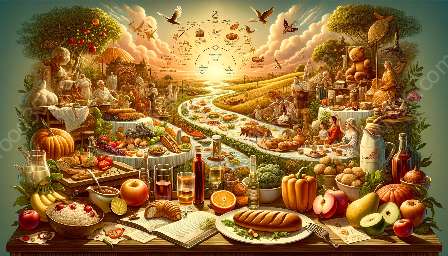Vegetarianism holds significant importance in religious practices and has had a profound impact on cuisine history across various cultures. This comprehensive guide explores the intersection of vegetarianism, religious beliefs, and the evolution of vegetarian cuisine. By understanding the role of vegetarianism in religious practices and its influence on cuisine history, we gain insight into the diverse cultural and spiritual significance of this dietary choice.
Vegetarianism in Religious Practices
Throughout history, many religious traditions have incorporated vegetarianism as a central tenet of their spiritual practices. The decision to abstain from consuming meat is often rooted in ethical, environmental, and health considerations, reflecting a deep reverence for all living beings. The practice of vegetarianism is not only a reflection of compassion but also serves as a means of demonstrating stewardship and respect for the natural world.
Hinduism: The Oldest Tradition of Vegetarianism
Hinduism, one of the world's oldest religions, places a strong emphasis on vegetarianism. The concept of ahimsa, or non-violence, is at the core of Hindu beliefs, leading many adherents to adopt a vegetarian lifestyle. The principle of ahimsa extends to all living creatures, and the consumption of meat is discouraged as it involves harm to animals. Consequently, vegetarian cuisine in Hinduism is characterized by an extensive array of plant-based dishes, rich in flavor and diversity.
Buddhism: Compassion and Non-Harm
Buddhism, another major world religion, also promotes vegetarianism as a manifestation of compassion and non-harm. The teachings of Buddhism emphasize the interconnectedness of all life and advocate for the avoidance of causing suffering to sentient beings. As a result, many Buddhist practitioners adhere to a vegetarian diet, nourishing their bodies with an abundance of plant-based foods that align with their spiritual principles.
Jainism: The Path of Non-Violence
Jainism, an ancient Indian religion, places a strong emphasis on non-violence and reverence for all living beings. The practice of vegetarianism is deeply embedded in Jain principles, reflecting a commitment to minimize harm and uphold the sanctity of life. Jain cuisine is characterized by its intricate and flavorful vegetarian dishes, prepared with a focus on mindfulness and ethical consumption.
Christianity, Judaism, and Islam: Varied Approaches to Vegetarianism
Within Christianity, Judaism, and Islam, attitudes toward vegetarianism vary among different denominations and sects. While some adherents choose to follow a vegetarian or plant-based diet as a form of religious observance, others do not consider it a central aspect of their faith. However, certain periods of fasting and religious observances within these traditions may involve temporary abstinence from meat, leading to the creation of diverse and delectable vegetarian dishes that uphold spiritual principles.
The Impact of Vegetarianism on Cuisine History
Vegetarianism has left an indelible mark on cuisine history, shaping the development of vibrant culinary traditions and culinary artistry across the globe. The rich tapestry of vegetarian cuisine history reflects the cultural, geographical, and religious diversity of the world, offering a window into the evolution of dietary practices and culinary creativity.
Early Vegetarianism: Ancient Roots and Philosophical Foundations
The history of vegetarian cuisine dates back to ancient civilizations, where traditional wisdom and philosophical teachings laid the groundwork for plant-based dietary practices. In cultures such as ancient Greece and India, influential philosophers and thinkers extolled the virtues of vegetarianism, championing its health benefits and ethical considerations. This era saw the emergence of elaborate vegetarian recipes and culinary traditions that celebrated the abundance of fruits, vegetables, and grains.
Global Vegetarian Traditions: Culinary Diversity and Flavorful Delights
As human societies expanded and intermingled, vegetarian cuisine evolved in tandem with cultural exchange and innovation. The world's culinary landscape blossomed with an array of vegetarian delicacies, each reflecting the unique heritage and culinary ingenuity of different regions. From the spicy and aromatic curries of India to the vibrant and savory mezes of the Mediterranean, vegetarian cuisine history is a testament to the artistry and diversity of plant-based gastronomy.
Modern Trends: Revival and Reinvention of Vegetarian Cuisine
In recent times, the resurgence of interest in vegetarianism has spurred a renaissance of plant-based culinary innovation. Contemporary chefs and food enthusiasts have reimagined and elevated vegetarian cuisine, integrating global flavors and cutting-edge techniques to create an enticing array of meatless masterpieces. This culinary renaissance has not only revitalized traditional vegetarian fare but has also paved the way for the emergence of sophisticated plant-based dining experiences that cater to diverse palates.
Cuisine History and Vegetarianism: A Symbiotic Relationship
The intricate interplay between vegetarianism and cuisine history underscores the enduring bond between dietary practices, cultural heritage, and spiritual values. Vegetarianism, deeply rooted in religious traditions, has transcended its spiritual underpinnings to become a celebrated and integral aspect of global cuisine history. As we continue to cherish and honor the rich legacy of vegetarian cuisine, we pay homage to the profound connections between food, culture, and spirituality that have shaped our culinary tapestry.
Cultural Heritage: Preserving Authentic Flavors and Culinary Traditions
Vegetarian cuisine history serves as a repository of cultural heritage, preserving authentic flavors and culinary traditions that have endured through generations. The art of creating vegetarian dishes is deeply intertwined with the customs, rituals, and familial gatherings of diverse cultures, reflecting a profound respect for the interconnectedness of food and identity.
Innovation and Adaptation: Navigating Culinary Boundaries and Gastronomic Creativity
The evolution of vegetarian cuisine history testifies to the human capacity for innovation and adaptation in the realm of gastronomy. Through experimentation and cross-cultural exchange, vegetarian culinary traditions have expanded, incorporating new ingredients, techniques, and flavor profiles that enrich the tapestry of global cuisine history.
Sustainable Living: Balancing Nourishment and Environmental Responsibility
Vegetarianism in cuisine history is also emblematic of humanity's quest for sustainable living and environmental stewardship. By embracing plant-based diets, individuals and communities advocate for eco-friendly practices, mindful consumption, and the preservation of biodiversity, aligning with the ethos of sustainability that transcends generations.

